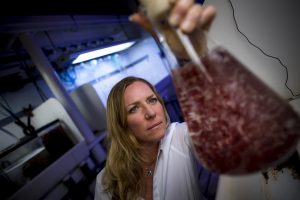How seaweed could help curb cow burps—one of California’s greatest sources of methane emissions

Scripps marine ecologist Jennifer Smith has been cultivating Asparagopsis taxiformis seaweed. Photo: Erik Jepsen/UC San Diego
Agricultural and marine scientists at the University of California have joined forces to combat one of the greatest sources of methane emissions in California: cow burps.
Scientists have found that a certain species of red algae seaweed, Asparagopsis taxiformis, produces a compound that could halt bovine production of methane, a powerful greenhouse gas that is 30 times more potent than CO2. This is significant because more than half of all methane emissions in California come from livestock, primarily from the state’s 1.8 million dairy cows as they burp, exhale, fart, and produce manure. Of these cattle-related emissions, belches pack the most punch, accounting for roughly 95% of the methane released into the environment.

